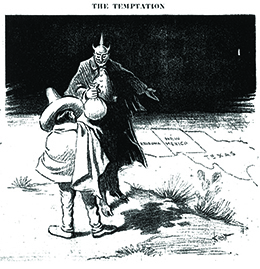| << Chapter < Page | Chapter >> Page > |

The likelihood that Mexico, weakened and torn by its own revolution and civil war, could wage war against the United States and recover territory lost in the Mexican-American war with Germany’s help was remote at best. But combined with Germany’s unrestricted use of submarine warfare and the sinking of American ships, the Zimmermann telegram made a powerful argument for a declaration of war. The outbreak of the Russian Revolution in February and abdication of Tsar Nicholas II in March raised the prospect of democracy in the Eurasian empire and removed an important moral objection to entering the war on the side of the Allies. On April 2, 1917, Wilson asked Congress to declare war on Germany. Congress debated for four days, and several senators and congressmen expressed their concerns that the war was being fought over U.S. economic interests more than strategic need or democratic ideals. When Congress voted on April 6, fifty-six voted against the resolution, including the first woman ever elected to Congress, Representative Jeannette Rankin. This was the largest “no” vote against a war resolution in American history.
Wilson’s last-ditch effort to avoid bringing the United States into World War I is captured in a speech he gave before the U.S. Senate on January 22, 1917. This speech, known as the “Peace without Victory” speech, extolled the country to be patient, as the countries involved in the war were nearing a peace. Wilson stated:
It must be a peace without victory. It is not pleasant to say this. I beg that I may be permitted to put my own interpretation upon it and that it may be understood that no other interpretation was in my thought. I am seeking only to face realities and to face them without soft concealments. Victory would mean peace forced upon the loser, a victor’s terms imposed upon the vanquished. It would be accepted in humiliation, under duress, at an intolerable sacrifice, and would leave a sting, a resentment, a bitter memory upon which terms of peace would rest, not permanently, but only as upon quicksand. Only a peace between equals can last, only a peace the very principle of which is equality and a common participation in a common benefit.
Not surprisingly, this speech was not well received by either side fighting the war. England resisted being put on the same moral ground as Germany, and France, whose country had been battered by years of warfare, had no desire to end the war without victory and its spoils. Still, the speech as a whole illustrates Wilson’s idealistic, if failed, attempt to create a more benign and high-minded foreign policy role for the United States. Unfortunately, the Zimmermann telegram and the sinking of the American merchant ships proved too provocative for Wilson to remain neutral. Little more than two months after this speech, he asked Congress to declare war on Germany.
Read the full transcript of the Peace without Victory speech that clearly shows Wilson’s desire to remain out of the war, even when it seemed inevitable.
President Wilson had no desire to embroil the United States in the bloody and lengthy war that was devastating Europe. His foreign policy, through his first term and his campaign for reelection, focused on keeping the United States out of the war and involving the country in international affairs only when there was a moral imperative to do so. After his 1916 reelection, however, the free trade associated with neutrality proved impossible to secure against the total war strategies of the belligerents, particularly Germany’s submarine warfare. Ethnic ties to Europe meant that much of the general public was more than happy to remain neutral. Wilson’s reluctance to go to war was mirrored in Congress, where fifty-six voted against the war resolution. The measure still passed, however, and the United States went to war against the wishes of many of its citizens.

Notification Switch
Would you like to follow the 'U.s. history' conversation and receive update notifications?